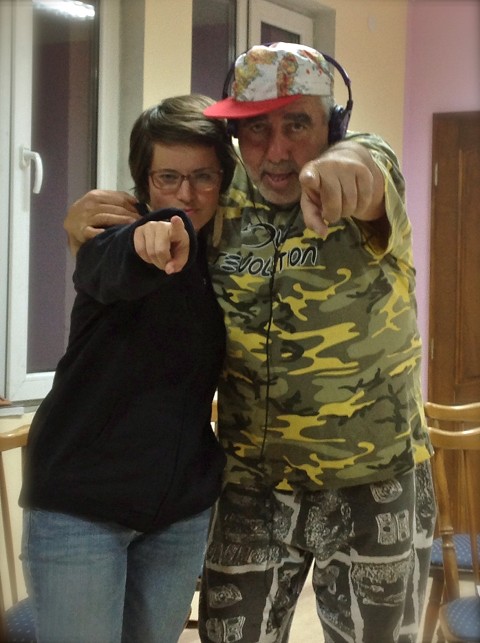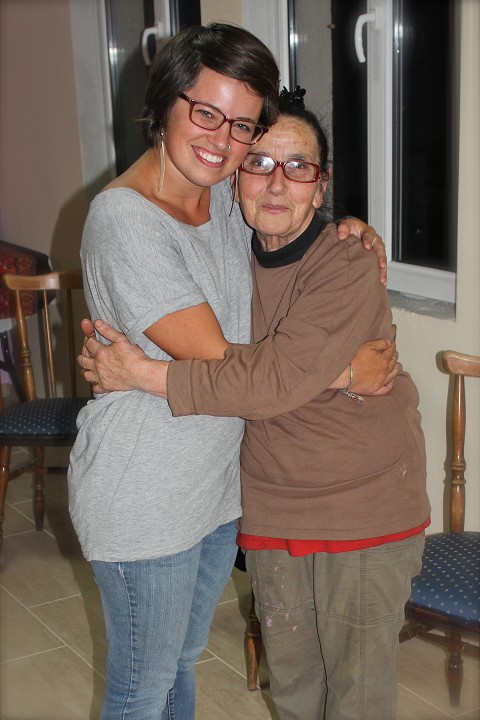Last month, my team lived and served in the community of Mokren, Bulgaria. We worked with a pastor of two churches, one in Mokren and the other in a town about four miles from there. The church in Mokren was in the process of being finished, so some of our work involved painting and yard work. However, Pastor Ivan was new to hosting World Race teams, and because of that, he didn’t always have a plan for ministry. In fact, two of his catch-phrases were, “I don’t know,” and “I have no plan.” We loved him and his kind, easy-going spirit. But needless to say, we had to become creative with our outreach.

Pastor Ivan in his "MC Hammer" work pants
We spent many evenings playing volleyball with gypsies and Romanians from the community. We also cleared weeds behind the restaurant where we ate most of our meals, and in front of the closed bar (complete with stripper poles) that we called home for the month. This was done for the old, beautiful woman who managed the restaurant, named Yanka. Yanka, or “Lili Yanka” as she loved to be called (“Lili” means “aunt” in Bulgarian), became our surrogate grandmother. She fussed over us, loved us, and showered us with hugs and kisses. So of course, we adored her.
I will never forget the day that we decided to clear out the weeds in her strawberry garden. She hadn’t asked us, but we had the time and wanted to serve her. As we were working, she came rushing towards us looking quite exasperated. Her arms were thrown in the air and although we never could understand what she was saying, emotion saturated her voice. Our hearts sunk in unison, as we feared we had made a terrible mistake in touching her garden.
When she arrived with tears glistening on her cheeks, she exclaimed, “Blagodaria, blagodaria, thank you very much!” She wasn’t upset with us; she was overwhelmed with gratitude. She explained in very few words that she didn’t have time to work in her garden because she was always working at the restaurant. And as she did this, she took the hoe from Josh and began to emphatically whack at the weeds herself. It was so humbling to see someone who despite her age was so ready and eager to work. The whole experience was quite beautiful. And I felt honored to serve a woman as selfless as her.

Lili Yanka and myself
There was one particular afternoon in which she served us such an extravagant meal that I was brought to tears. I felt so undeserving of the food that was given to us, and of the way she served us. She would often give us free meals, and when she charged us, it was just for the food, not the preparation. The blessings from Lili Yanka were a gentle reminder of God’s amazing grace that has been “lavished on us, with all wisdom and understanding,” even though we are so unworthy (Ephesians 1:8).
However, Lili Yanka wasn’t the only one whose servant heart brought me to this place. We didn’t have a shower or a washing machine, so in order to keep decent hygiene we had to look to the people around us. Our translator Mitko and his wife Nasi rose to the occasion. They opened their home. They served us pizza and coffee and soda. And they allowed us to sit on their couch and use their Internet late into the evening. Pastor Ivan and his wife provided lunch at their house between services every Sunday. Ivan doted on us with ice cream and randomly gave us flowers. Even many of the women from the church invited us to their homes for dinner. They all came from very broken situations: some widowed, some sick, some who had lost children. And all were financially needy. But still, they eagerly served us.

Our team, along with one of the families from the church who served us dinner
The church of Mokren showed me what it looks like to live humbly and give freely. And they didn’t give out of abundance; they gave even when it hurt to give. Lili Yanka told us that she didn’t know how the utility bills would be paid for from the month we spent living in the bar, but she trusted that the Lord would provide.
In the book Radical: Taking Back Your Faith from the American Dream, David Platt shares about a wealthy man from his church that decided to sell his house and give away many of his possessions in order to invest his resources in for the glory of Christ. This man told David, “I wonder at some points if I’m be irresponsible or unwise. But then I realize there is never going to come a day when I stand before God and He looks at me and says, 'I wish you would have kept more for yourself.' I'm confident that God will take care of me” (p. 123).
I believe the church of Mokren is a living example of this. And I’ve noticed as I’ve traveled through six countries, that those with less tend to give more. It reminds me of the woman in Mark 12:
“(41-44) Jesus sat down opposite the place where the offerings were put and watched the crowd putting their money into the temple treasury. Many rich people threw in large amounts. But a poor widow came and put in two very small copper coins, worth only a few cents. Calling his disciples to him, Jesus said, “Truly I tell you, this poor widow has put more into the treasury than all the others. “They all gave out of their wealth; but she, out of her poverty, put in everything—all she had to live on.”
 The Bulgarian countryside
The Bulgarian countryside
So why is it that the poor seem to give more? I believe it is because we are in bondage to our possessions. We feel entitled to the things we earn through hard work. And we secretly become spiteful when we see a commercial or news article or blog post about starving children in Africa, because we get those stabbing pangs of guilt. And then we rationalize. We do a quick tally of the money and the time that we give to our church, to charities, and to missionaries… and we let that satisfy our uneasiness about the things we hold onto, when much of the world holds so much less.
David Platt writes, “I don’t want to pursue stuff…and in the process miss Christ and the pleasures he alone gives in a life free from bondage to the possessions of this world. Ultimately, I don’t want to miss eternal treasure because I settle for earthly trinkets. “Where your treasure is,” Jesus says, “there your heart will be also” (Matthew 6:21). The way we use our money is a barometer of our present spiritual condition. Our neglect of the poor illustrates much about where our hearts lie. But even more than that, the way we use our money is an indicator of our eternal destination. The mark of Christ followers is that their hearts are in heaven and their treasures are spent there" (p. 138).
So what did I learn this month? I learned I want to become more like those who have less. I want to give freely, because I have received freely (Matthew 10:8). And I challenge you to do the same. And to trust that our God is a good God, and he will take care of us. And I challenge you to read Radical, because the things David Platt writes about are truths that call our hearts into action.
As of today, I still must raise $2,786.54 by July 1 to finish out this mission set before me. Please pray with me that the funds will come in and share with others about my journey and need.
Donations can be made by clicking on the left-hand side of my blog-page where it says "Support Me!" and following the instructions.








